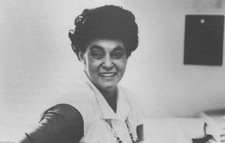
- Inducted:
- 2012
Aunty Mollie Dyer was a staunch defender of Aboriginal children in care, at a time when their needs were often neglected. Big-hearted and strong-willed, she successfully lobbied for reforms to Victoria's social welfare system, and played an integral role in the establishment of several important Aboriginal-run organisations.
Born in 1927, the Yorta Yorta woman was the daughter of Margaret Tucker, a prominent Aboriginal activist, and an Irishman, Philip Tucker. Mollie spent much of her early childhood with her paternal grandparents in Hawthorn and at the family's orchard in Hastings. Her mother was an important role model to Mollie, involving her in fundraising activities and community work from an early age.
Educated at a convent in Abbotsford, Mollie was a model student with a talent for the violin. Although she was the only Aboriginal child at her school, she regularly visited her mother's family at the Cummeragunja Mission in New South Wales and felt equally comfortable among Aboriginal and non-Aboriginal people.
Mollie entered the workforce as a 15-year old, while her father was serving in the Second World War. She was first made aware of the negative attitudes that existed towards Aboriginal people when an employer discouraged her from revealing her heritage. A defiant pride grew out of similar incidents. Years later she quit a job as a cleaner when racism saw her wrongly accused of theft.
In 1947, Mollie married Alan Burns. They had six children together, before the marriage ended. All of Mollie's children grew up to contribute in some way to Aboriginal affairs. Mollie remarried to Charlie Dyer, who was a close supporter of her work.
Wherever she lived, Mollie opened her home to those in need. She fostered 20 Aboriginal children in her lifetime and provided short-term accommodation for countless others. In doing so, Mollie became acutely aware of the devastating impact the welfare system could have on Aboriginal families.
During the 1960s and 70s, Mollie was among a group of dedicated Aboriginal women who, despite a lack of funding, delivered essential services to their long neglected community. They also formed several councils to take their fight to the national stage. Mollie formalised her hitherto ad hoc involvement with the Aborigines Advancement League by accepting a full time position there in 1966, where her focus was on welfare issues.
After moving to the newly established Aboriginal Legal Service (ALS) in 1973, the capable and versatile Mollie quickly proved indispensable. She was available to anyone, particularly children, at any hour. When the Legal Service set up a hostel for its clients, Mollie and Charlie staffed it at weekends.
Increasingly, Mollie's work concerned the issue of Aboriginal adoption. Aboriginal children were regularly removed from their families by the state welfare department and, in the majority of cases, fostered or adopted out to non-Aboriginal people. This resulted in a loss of cultural identity, as well as significant emotional damage, with serious consequences for many later in life. Mollie campaigned tirelessly for Aboriginal children to be placed with Aboriginal families whenever possible.
The idea for an Aboriginal-run agency to support Aboriginal children and families was first discussed at a national adoption conference in 1976, where Mollie delivered an impassioned speech. Not long after, the Victorian Aboriginal Child Care Agency (VACCA) was incorporated, with Mollie - full of ideas following a study tour to the USA - appointed as Program Director. A support group for adoptive parents of Aboriginal children was an early success. Mollie also helped secure direct federal funding for VACCA, thereby guaranteeing the autonomy necessary for the organisation to perform effectively. Within three years of operation, there had been a 40% reduction in the number of Aboriginal children in care.
Mollie lobbied hard to secure agreement from the state government that VACCA be consulted in all welfare-related decisions affecting Aboriginal children and helped draft guidelines that ultimately came to be enshrined in legislation - a testament to her ability to work successfully with government without compromising her belief in self-determination for Aboriginal people. VACCA inspired similar organisations around Australia and Mollie was instrumental in establishing the Secretariat of National Aboriginal and Islander Child Care (SNAICC) in 1981. She was made a life member of VACCA.
During the 1980s, Mollie left VACCA, but retirement was a distant prospect. She was recruited as one of the first community development officers stationed in regional Victoria to support the state's Aboriginal co-operatives. In the years that followed, Mollie convened several awareness-raising conferences for public servants and held positions on multiple boards and committees. She helped establish the Brambuck Living Cultural Centre in Halls Gap and was a member of a Local Aboriginal Education Consultative Group. All the while, she remained a respected and trusted spokesperson for the Aboriginal community.
By the time she passed away in 1998, Aunty Mollie had been recognised with a Member of the Order of Australia medal, an International Year of the Child award and an Advance Australia Medal. The VACCA headquarters was named in her honour, as was a street in a Canberra suburb.
Aunty Mollie successfully fought for the right of all Aboriginal children to engage with their heritage and culture. Through her efforts she challenged institutionalised prejudices at the highest levels, forging a legacy of respect and understanding that lives on today.
Updated

